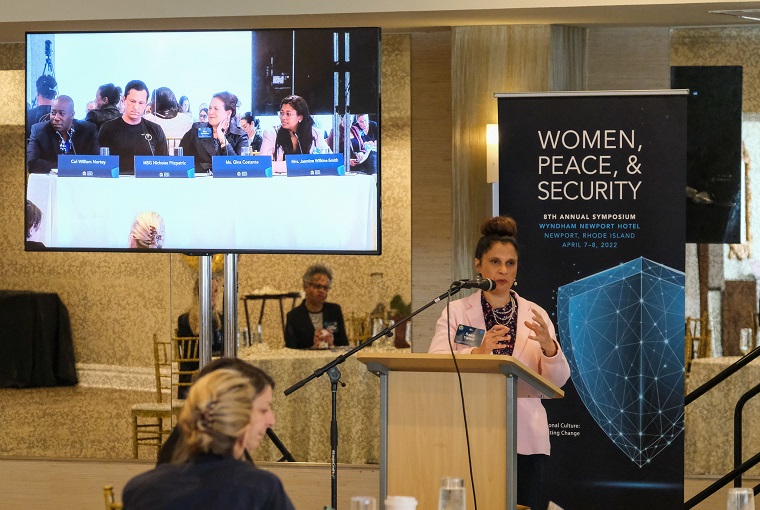U.S. Naval War College Hosts Women, Peace and Security Symposium

Newport, R.I.–The U.S. Naval War College (NWC) hosted the 8th Women, Peace and Security (WPS) symposium, April 7-8. The primary aim and theme of the 2022 WPS symposium was to facilitate the integration of women, peace and security throughout the Department of Defense (DOD) by considering the role of organizational culture in effecting sustainable institutional change.
Saira Yamin, Ph.D., Ambassador Swanee Hunt Women, Peace, and Security chair, U.S. Naval War College, explained the importance of women in national security, strategic thinking and problem solving.
“To enable women’s meaningful participation in peace and security, more careful consideration must be given to their increased recruitment and retention,” said Yamin. “They must have equal access to training, education and opportunities to serve in roles where they are underrepresented, and visible in leadership positions. Integrating the gender perspective in strategic thinking and problem-solving will lead to more durable outcomes and innovations in our responses to the complex security challenges we face today and will face in the future.”
Bringing together a variety of experts from U.S. and non-U.S. military and civilian organizations, the Naval War College’s WPS symposium included four panels that examined efforts to implement DOD’s WPS framework and integrate WPS concepts like gender equality, women’s empowerment, and diversity, equity, and inclusion through the lens of organizational culture.
Symposium keynote speakers discussed organizational culture, highlighting the effectiveness of behavioral design in changing culture and the importance of recognizing the continuing and reciprocal relationship between culture, change and leadership. Panelists also discussed current WPS-related activities involving security cooperation, defense support of civil authorities, and leadership, noting how WPS can facilitate positive change in DOD organizational culture and the overall effectiveness of the force.
The afternoon sessions involved, for those attending in person, an interactive exercise using a design thinking approach to tackle the following WPS problem: How might we encourage the DOD to see WPS as an integral element of national security?
Naval War College Professor Brenda Oppermann co-organized the symposium and explained why WPS is important to the DOD.
“WPS provides DOD with a national security framework for enhancing the military’s operational effectiveness, increasing its ability to mitigate risk to the force and improving U.S. efforts to compete globally. The positive outcomes resulting from implementing WPS enhance our efforts to ensure national security by promoting global security,” said Oppermann. “WPS directly contributes to this mission by providing a framework and tools to address a wide variety of critical security issues. More importantly, WPS refines leaders’ analytical skills, which helps them develop a mindset to operate in today’s complex security environment.”
DOD’s WPS Community of Interest (COI) continues to expand globally as evidenced by creating COIs addressing specific topics like security cooperation, force development and Joint Professional Military Education (JPME) academics, as well as COIs representing various geographic regions.
“As more men and women in the Defense Department learn about WPS and engage in efforts to implement this important national security issue, the greater the need becomes for members of this community to come together to share their knowledge and experience,” said Oppermann. “The Naval War College’s annual WPS symposium directly facilitates these activities.”
This year’s symposium brought together 70 in-person participants and approximately 200 virtual participants. Both sets of attendees engaged in networking, resulting in improved strategies for effectively implementing WPS throughout the DOD, the creation of new WPS initiatives, enhanced cooperation and collaboration.
NWC has been at the forefront of exploration into national and international issues involving WPS, working toward the goal of empowering women in conflict and peace.
